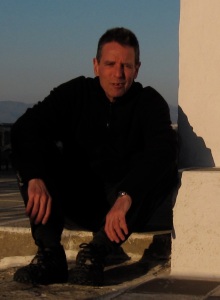Broadside #37 (Winter 2015 / 15.2)
George Moore
Popular Culture
It begins when I’m sitting still and ends in murder, so I switch it off. The unremembered disappear in quick chemical reactions like love, then comes the blackout. In the dark, the body is all we have. As much as possible, I try to leave out the politically correct names of things; I work around them with pronouns. It is the most common here. We evaporate like a pool of standing water in the sun. No one can get beyond these lingering side effects of the dominant culture. Bruises that go deep as the bone. The dishpan hands, the dilated eyes, the reversals of history. The self in a spotlight melts. It is, after all, blinded to everything but itself. Each small new world of expectation flattens out beneath the weight of desire. And yet, others around me fly, invincible, in their skintight red suits, lifting the right word above their heads like a sword. Why then is it so impossible to believe that the sentence ends? What will the archaeologists say when they discover this small doll that speaks only in monosyllables, but expresses the whole of cultural theory, limited only by our time?
~
Author’s commentary: I suppose poetry can be like an original form of the selfie. That is, more than just about oneself, more like presenting the “self” out there in the world. Of course, in the postmodern world, that self is a construction, a fantasy perhaps. Or maybe that’s just the way we see it at the moment. The context of a poem for me comes from my own reflections on what the poem could have been, if I’d just let it run its normal “poetic” course. I react to that as a write, and the poem itself changes, even becomes indistinguishable from its first impulse.
I think about poetry in the old sense sometimes, about how those love lyrics of Whitman’s and Heaney’s and Paz’s are about the self but not about “a self.” I think that might defeat the efforts today to talk about post-lyric, post-language, post-toastees. Everything is beyond. That might be my sense of popular culture. Everything is trying to be beyond. Not get beyond, but simply be there, out front, beyond whatever is now. I am not in a hurry to step off that edge I guess. I’d rather see a continuity of all the questions in the past and all the unanswered moments in the future. That is, nothing really gets old, it just gets unused.
When I think of popular culture, I think of minimalist, monochrome paintings of the 1960s. All the canvas one color, like Yves Klein’s work. At the moment of their popularity, they were earth-shattering. Today, they look a little silly. The cutting edge usually manages to cut something important out perhaps. I tend to think back to a lyric episode when I imagined myself standing on the shore of an ocean, having just discovered the Statue of Liberty buried in the sand. That sense of time is real history, circular, folded in on itself. But popular culture today demands that time be recalculated. It is now okay to say the universe will end, that it begins with a Bang and will die out in blackholes. The thought for me is that we have been here long enough to know that getting to the end of time is not actually the point.
So what is the difference, lyrically, if we sing now or if we refuse to sing because everyone has sung before us? I’ve always liked Einstein’s remark that the past, present and future are only illusions, but persistent ones. Nothing to be done, I think Beckett said. For me, popular culture is dangerous only if we forget it is only popular. We have to make fun of ourselves because, guaranteed, the future is going to do so. As Benny Profane says, keep cool, but care. There’s something important in that.

